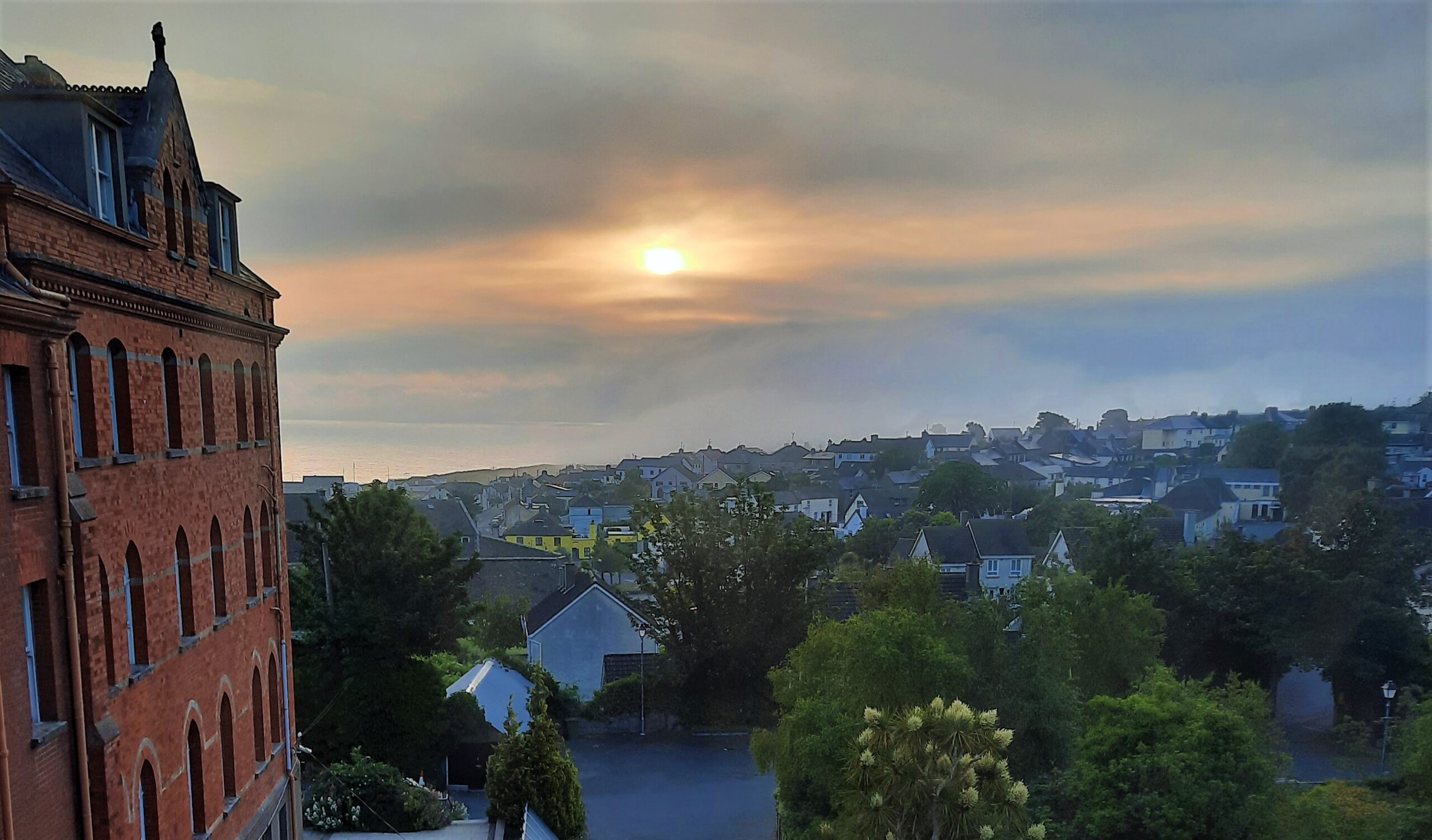Elizabeth McArdle of the Columban Ecological Institute reports on the 2021 Summer School with Dr John Feehan, which took place between 28th June and 3rd July 2021 at An Tairseach.
Every Bush Aflame: God and the Natural World
It was with a sense of adventure that I headed south from Dalgan to County Wicklow with my car packed with microscopes, books, waders, sampling equipment and all the paraphernalia required for a 6-day long summer school.
For the first time, we (The Columban Ecological Institute) were working in partnership with An Tairseach, in Wicklow Town, which is managed by the Dominican Sisters.
The previous year, Covid had prevented us from hosting a summer school, so it was no wonder that I was filled with anticipation and with Dr John Feehan as course director we were assured that the coming week would be one of learning, new experiences and many moments of wonder and awe.
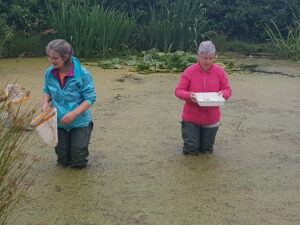
Aoife and Fionnuala sampling.
Each day began with a ritual in the Cosmic Garden which was beautifully guided by Sr Colette Kane. Breakfast was followed by a lecture and after coffee we headed out for a field work session. In the afternoon, with the aid of a microscope, the participants settled down to study their samples and biological findings.
Day one and two were dedicated to the study of the wildflowers which grew in the organic gardens and vegetable fields of An Tairseach. We encountered many wonderful wildflowers along with some of their pollinators. Among them were corn spurrey, field violet, goosefoot, field poppies, purple foxglove, red deadnettle and the beautiful moon daisy.
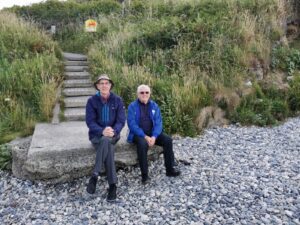 Our appreciation of wildflowers increased as the participants studied them with the new eyes of the microscope. It helped them to see that they are created with the same loving care as we are and they are biologically, chemically and physically as unique as we are, each in their own way.
Our appreciation of wildflowers increased as the participants studied them with the new eyes of the microscope. It helped them to see that they are created with the same loving care as we are and they are biologically, chemically and physically as unique as we are, each in their own way.
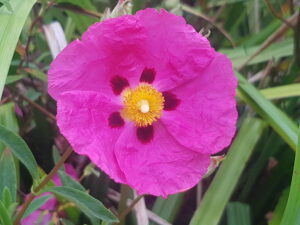
Rock Rose
On day four we headed up to the organic pastures of An Tairseach to sample a small stream fed pond to establish its water quality based on biological sampling alone. Waders were donned by the people going into the pond and with sampling nets, the pond creatures were gently removed from their watery environment and placed in buckets, held at the ready by the assistants on the banks.
Back in the centre, with the aid of the microscopes, great experiences were had by all, especially the first timers, who were in awe of the incredible complexity of the creatures we had sampled. These included mayflies, iridescent water beetles, larvae of non-biting midges, horse leeches and exquisitely coloured water fleas.
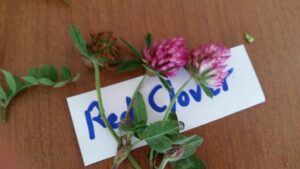 With a simple Water Pollution Test Kit, we established that the water was of good quality. Later in the evening, the creatures were returned to their pond.
With a simple Water Pollution Test Kit, we established that the water was of good quality. Later in the evening, the creatures were returned to their pond.
On Thursday evening a moth trap was placed in the long grass of the wild garden. As we drifted off to sleep, we mused on the treasures that the morning might bring, and we were not disappointed. Wonderful moths with equally wonderful names had been trapped.
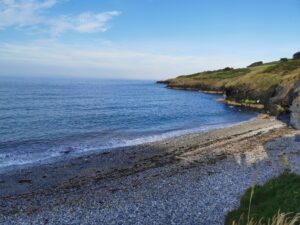 Among them were the Powered Quaker moth, the Dingy Skipper, the Yellow Underwing and the Garden Tiger. When viewed under the microscope their hidden beauty was revealed and the room was filled with “Ohs!” and “Wows!” and many other favourable exclamations.
Among them were the Powered Quaker moth, the Dingy Skipper, the Yellow Underwing and the Garden Tiger. When viewed under the microscope their hidden beauty was revealed and the room was filled with “Ohs!” and “Wows!” and many other favourable exclamations.
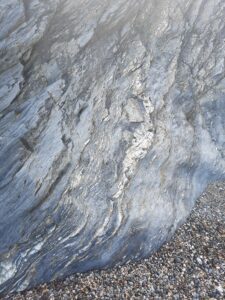 In the afternoon, after a geological lecture, a walking tour of Wicklow Town revealed that we were among the mica schists of the Ordovician geological era. These rocks date back 580 million years when Ireland was part of the small continent of Avalonia.
In the afternoon, after a geological lecture, a walking tour of Wicklow Town revealed that we were among the mica schists of the Ordovician geological era. These rocks date back 580 million years when Ireland was part of the small continent of Avalonia.
During a mountain building episode called the Caledonian erigony, the parent rocks of mudstones and sandstones (which are still visible on the few beaches along the rocky shoreline) were overturned and folded. Very hot granite magma was injected into these older rocks which baked them and in the remaining spaces and voids, mica schist was sweated into them. We are planning to study this subject further in a future summer school, maybe 2022.
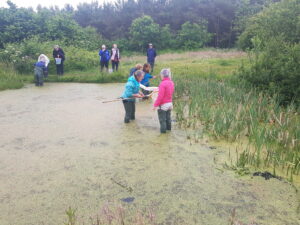 Among the many people to thank for the success of the summer school are the Dominican Sisters, especially Sr Colette Kane. Their genuine kindness was evident everywhere from the spotless accommodation to the nourishing organic food grown in their fields and gardens.
Among the many people to thank for the success of the summer school are the Dominican Sisters, especially Sr Colette Kane. Their genuine kindness was evident everywhere from the spotless accommodation to the nourishing organic food grown in their fields and gardens.
Deep appreciation also goes to Thierry and his team for the love and care in which our food was prepared and served. To the participants: I could not even begin to document their dedication and open-minded approach to the very complex subject matter. Without them, the summer school would not have been possible.
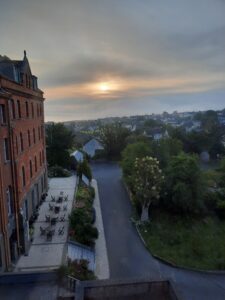 Lastly, our appreciation goes to Dr John Feehan, who skilfully guided us through the wonder of seeing God in the natural world. We are deeply grateful to John for his life-changing insights, and we hope that for many years to come he will continue to inspire us and deepen our awareness of the role of the natural world in God’s unfolding plan.
Lastly, our appreciation goes to Dr John Feehan, who skilfully guided us through the wonder of seeing God in the natural world. We are deeply grateful to John for his life-changing insights, and we hope that for many years to come he will continue to inspire us and deepen our awareness of the role of the natural world in God’s unfolding plan.
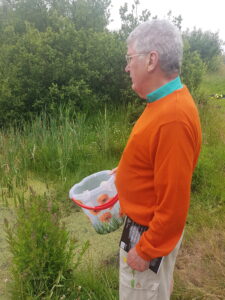
Sean McDonagh
On behalf of Fr Sean McDonagh and myself in the Columban Ecological Institute in Dalgan, thank you to everyone who helped to make the Summer School 2021 so memorable.

